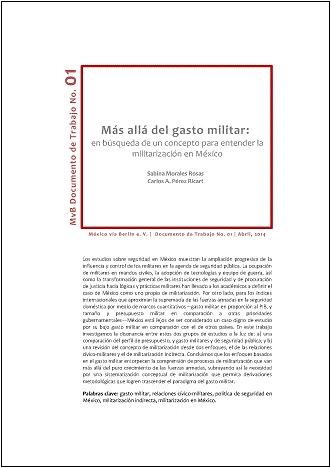MvB_WP_2014_001_mpr_Más allá del gasto_FULL (1
Morales Rosas, Sabina y Carlos A. Pérez Ricart. “Más allá del gasto militar: en búsqueda de un concepto para entender la militarización en México” MvB Documentos de trabajo. Berlín: México vía Berlín e. V.
No. 1, 2014: 41.
Resumen
Más allá del gasto militar: en búsqueda de un concepto para entender la militarización en México / Autores: Sabina Morales Rosas & Carlos A. Pérez Ricart / Working Paper, Nr.1 (2014)
Los estudios sobre seguridad en México muestran la ampliación progresiva de la influencia y control de los militares en la agenda de seguridad pública. La ocupación de militares en mandos civiles, la adopción de tecnologías y equipo de guerra, así como la transformación general de las instituciones de seguridad y de procuración de justicia hacia lógicas y prácticas militares han llevado a los académicos a definir el caso de México como uno propio de militarización. Por otro lado, para los índices internacionales que aproximan la supremacía de las fuerzas armadas en la seguridad
doméstica por medio de marcos cuantitativos—gasto militar en proporción al PIB, y tamaño y presupuesto militar en comparación a otras prioridades gubernamentales—México está lejos de ser considerado un caso digno de estudio por su bajo gasto militar en comparación con el de otros países. En este trabajo investigamos la disonancia entre estos dos grupos de estudios a la luz de: a) una
comparación del perfil de presupuesto, y gasto militares y de seguridad pública; y b) una revisión del concepto de militarización desde dos enfoques, el de las relaciones cívico-militares y el de militarización indirecta. Concluimos que los enfoques basados
en el gasto militar entorpecen la comprensión de procesos de militarización que van más allá del puro crecimiento de las fuerzas armadas, subrayando así la necesidad por una sistematización conceptual de militarización que permita derivaciones metodológicas que logren trascender el paradigma del gasto militar
Zusammenfassung
Jenseits der Militärausgaben: Die Suche nach einem Begriff zum Verständnis von Militarisierung in Mexiko/ Autoren: Sabina Morales Rosas und Carlos A. Pérez Ricart
Die Forschung zur Sicherheitspolitik in Mexiko zeigt zunehmenden Einfluss und wachsende Kontrolle seitens der bewaffneten Kräfte auf die Politik zur inneren Sicherheit. Die Übernahme von Zivilposten durch das Militär, der Rückgriff auf Kriegs-Technologie und Ausrüstung sowie die allgemeine Veränderung von Sicherheits- und Rechtspflegeinstitutionen in Richtung militärischer Denk- und Vorgehensweisen haben dazu geführt, dass Wissenschaftler Mexiko als einen militarisierten Staat bezeichnen. Auf der anderen Seite erregt dies kaum Aufmerksamkeit aufgrund seines im Vergleich zu anderen Ländern geringen Militärhaushalts. Dies zeigen internationale Indizes, mit denen die Vormachtstellung
des Militärs bei der inneren Sicherheit durch quantitative Methoden bestimmt wird, wie Militärausgaben als Anteil des BIPs oder die Größe des Militärs und der Rüstungshaushalt verglichen mit anderen Regierungsprioritäten. In dieser Arbeit untersuchen wir die einander widersprechenden Ergebnisse der empirischen Forschung über Mexiko im Hinblick auf folgende Punkte: a) einen Vergleich
zwischen Haushalt und Ausgaben des Militärs und der öffentlichen Sicherheit; b) eine Analyse des Begriffs Militarisierung aus zwei Perspektiven: der zivil-militärischen Beziehungen und der indirekten Militarisierung. Wir kommen zu dem Schluss, dass der Ausgaben-basierte Ansatz die Analyse von Militarisierungsprozessen verhindert, welche den Rahmen des bloßen Zuwachses bewaffneter Kräfte sprengen. Dabei betonen wir die Notwendigkeit einer Systematisierung jener Begriffe, die methodologische Ableitungen erlauben, um das Paradigma des Militärausgaben-Modells zu überwinden.
Abstract
Beyond military expenditure: In search of a concept for understanding militarization in Mexico / Authors: Sabina Morales Rosas and Carlos A. Pérez Ricart
Security studies on Mexico show the progressive extension of military influence and control over the public security agenda. The occupation of civil positions by military officials, the adoption of war equipment and technology, as well as the general transformation of security and law enforcement institutions towards military reasoning and practice have led scholars to define the case of Mexico as one of militarization. On the other hand, for international indices that approach, i.e. armed forces supremacy in domestic security through quantitative frameworks—military expenditure as share of the GDP and size and military budget, compared to other governmental priorities—Mexico is far from deserving attention for its low military budget compared to other countries. In this paper, we inquire the dissonance between these two groups of studies considering: a) a comparison between military budget and expenditure and of public security and b) a review of the concept of militarization from two approaches, the civil-military relations and indirect militarization. We conclude that approaches based on military expenditure hinder the understanding of militarization processes that go beyond the very growth of armed forces by stressing the need for a conceptual systematization of militarization that allows methodological derivatives able to transcend the military expenditure paradigm.


